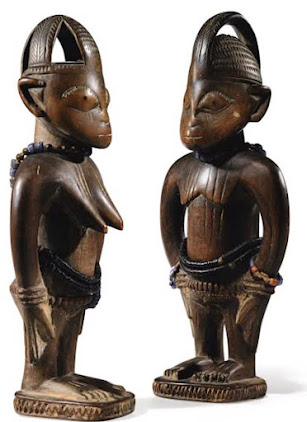 |
| Photo credit: Pin interest |
An extract from a publication released by: TIMOTHY MOBOLADE
By: Shittu Barakat
Yorubas worship ibeji as a god. This god is portrayed by two wooden figures. This happens because the two figures represent the two twin children traditionally known as Taiyewo and Kehinde. The ibeji god is given sacrifices of beans and vegetable soup.
The twins' parents make sacrifices to the ibeji god at least until the mother gives birth to another baby after the delivery of the ibejis. This other child is known as Idowu, otherwise referred to as esu lehin ibeji, (trickster behind twins) because the Idowus are usually very difficult children.
Traditionally, the Yorubas regard ibejis as divine children who are capable of bringing affluence to either or both of their parents or impoverishing them according to how well they are treated.
Often the ibeji may tell its mother to dance about begging for alms. This type of ibeji is known as "Onijo, " that is "dancers,"If the mother fails to accomplish the ibejis' wish, the result might be permanent sickness of the twins or their ultimate death, which is, of course, terribly painful to the mother. Also, the mother may fall sick and eventually die.
The ibeji children are rather festive. And so every week, fortnightly or monthly the twins' mother makes a feast for her children. This is a sacrifice to the ibeji god This sacrifice is offered with some of the following palm oil beans, red palm oil, vegetables, and ekuru. All are welcome in this sacrificial feast, especially the neighboring children.
It is widely assumed that the food liked best by ibeji children is that prepared with beans and red palm oil (ewa or tunpulu), and ekuru which is also made with beans.
The ibeji figures are actively worshipped if, after the twins' death, ill fortune befall either or both of the parents. Such ill fortune might be:
(1) stoppage of the mother's menstruation, (2) miscarriage during pregnancy, (3) unusually long periods of pregnancy, (4) infant mortality, (5) sudden poverty, (6) destruction of property by such things as white ants, (7) persistent sickness of either of the parents.
To cure or prevent what may result from the twins' indignation because of the improper care given to them by their parents, the ibejis' are usually well brought up and deified by their parents. If the father neglects the mother and feels no worry about the welfare of dying twins, the father will suffer; so also for the mother who fails to succor her husband in dying necessary care of the children.
Edited by: Adebayo Nurudeen and Gbolade Akeem
Published by: Mondiu Sherifat Oluwaseun
